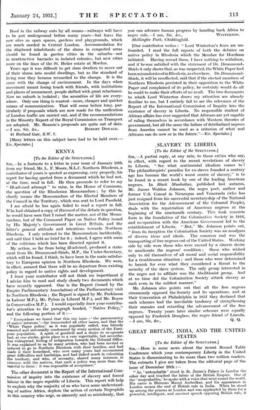KENYA [To the Editor of the SPECTATOR.] SIR,—In a footnote
to a letter in your issue of January 10th from my friend, Mr. L. F. Moore, M.L.C. Northern Rhodesia, a
contributor of yours is quoted as expressing, very properly, his regret for having quoted from a document which he had not,
at the time, read in full. He then proceeds to refer to my Ill-advised attempt " to raise, in the House of Commons,
the question of the Rhodesian Memorandum ; by this he clearly means the Memorandum of the Elected Members of the Council in the Territory, which was sent to Lord Passfield.
I am afraid he has again failed to read a report in full. If he had obtained a copy of Hansard of the debate in question, he would have seen that I raised the matter, not of the Memo- randum, but of the Command Paper on Native Policy issued by His Majesty's Government in Great Britain, and the latter's general attitude and intentions towards Northern Rhodesia. I only referred to the Memorandum incidentally, and said that I held no brief for it ; indeed, I agree with some of the criticism which has been directed against it.
My action, so far from being ill-advised, produced a state- ment from Dr. Drummond-Shiels, M.P., the Under-Secretary, which will be found, I think, to have been in the main satisfac- tory to European opinion in Northern Rhodesia. We were, in effect, assured that there will be no departure from existing policy in regard to native rights and development.
I trust your contributor will not think me impertinent if I advise him to read and study closely two documents which have recently appeared. One is the Report (issued by the Empire Parliamentary Association) of the Parliamentary visit to Northern Rhodesia ; the Report is signed by Mr. Parkinson (a Labour M.P.), Mr. Pybus (a Liberal M.P.), and Mr. Boyce (a Conservative M.P.). I would especially draw your contribu- tor's attention to the paragraph headed, " Native Policy," and the following portion of it :—
"Everywhere we found that this one issue—' the paramountcy of native interests '—far transcended all other issues, and that the White Paper policy,' as it was popularly called, was bitterly resented and universally condemned by every section of the Euro- pean population. A spirit of goodwill and a desire to co-operate had, at one stroke, given place to a very regrettable, but neverthe- less widespread, feeling of indignation towards the Colonial Office. It was explained to us by many settlers, who had been invited or induced to go to Northern Rhodesia with their families, and had made it their homeland, who over many years had encountered great difficulties and hardships, and had risked much in colonizing the territory, and who, of necessity, shared many interests in common with the natives, that such a policy was more than dis- tasteful to them : it was impossible of acceptance."
The other document is the Report of the International Com- mission of inquiry into the existence of slavery and forced labour in the negro republic of Liberia. This report will help to explain why the majority of us who have some understand- ing of native Africa, deplore the action of certain Negrophils in this country who urge, so sincerely and so mistakenly, that you can advance human progress by handing back Africa to negro rule.—I am, Sir, &c., WINTERTON. Shillinglee Park, Chiddingfold.
[Our contributor writes : " Lord Winterton's fears are un- founded. I read the full reports of both the debates on native policy in Rhodesia which the Member for Horsham initiated. Having reread them, I have nothing to withdraw, and if he was satisfied with the statement of Dr. Drummond- Shiels it only shows that, as was suspected, the White Paper had been misunderstood in Rhodesia, as elsewhere. Dr. Drummond- Shiels, it will be recollected, said that if the elected members of Northern Rhodesia persisted in their opposition to the White Paper and complained of its policy, he certainly would do all he could to make their efforts of no avail. The two documents to which Lord Winterton draws my attention are already familiar to me, but I entirely fail to see the relevance of the Report of the International Commission of Inquiry into the existence of slavery in Liberia. No responsible student of African affairs has ever suggested that Africans are yet capable of ruling themselves in accordance with Western theories of government, but all the same the failure of detribalized negroes from America cannot be used as a criterion of what real Africans can do now or in the future."—En. Spectator.]






































 Previous page
Previous page